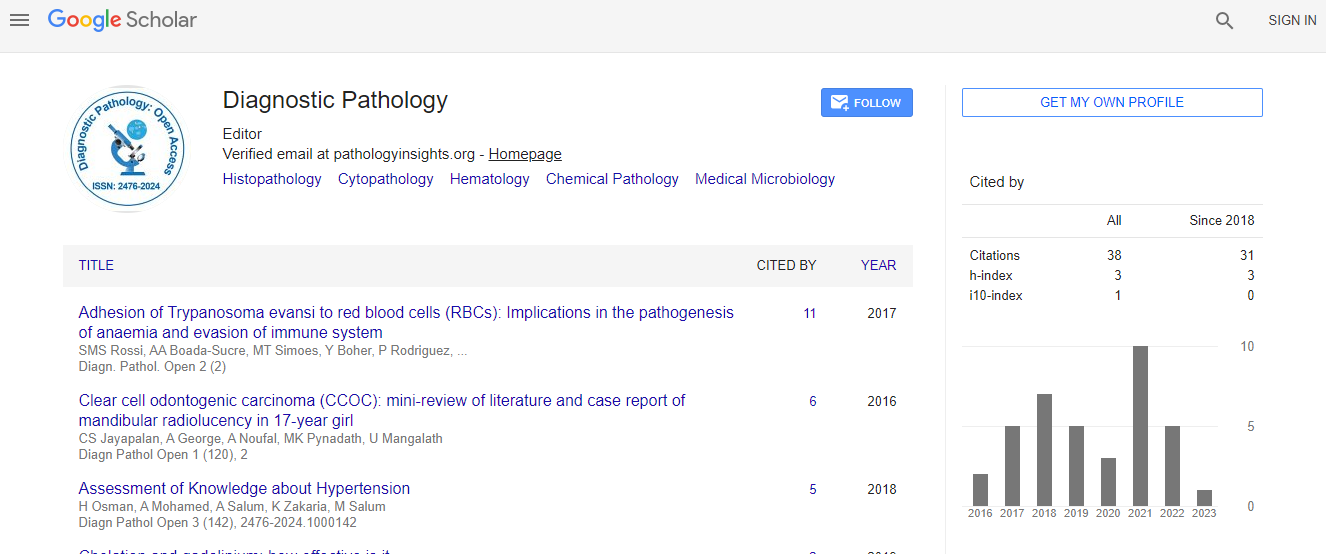Our Group organises 3000+ Global Conferenceseries Events every year across USA, Europe & Asia with support from 1000 more scientific Societies and Publishes 700+ Open Access Journals which contains over 50000 eminent personalities, reputed scientists as editorial board members.
Open Access Journals gaining more Readers and Citations
700 Journals and 15,000,000 Readers Each Journal is getting 25,000+ Readers
Google Scholar citation report
Citations : 110
Diagnostic Pathology: Open Access received 110 citations as per Google Scholar report
Diagnostic Pathology: Open Access peer review process verified at publons
Indexed In
- Google Scholar
- RefSeek
- Hamdard University
- EBSCO A-Z
- Publons
- Euro Pub
- ICMJE
Useful Links
Share This Page
Thymoquinone synergizes the anticancer properties of cisplatin against head and neck squamous cell carcinoma and protects normal oral epithelial cells
13th International Conference on Laboratory Medicine & Pathology
Omar M Al Aufi, Abdulwahab Noorwali, Fatheya Zahran, Ahmed M Al Abd, Safia Al Attas and Fahd M Almtutairi
Comperhensive Specialized Ployclinic for Security Forces in Medina, Saudi Arabia. King Abdulaziz University, Saudi Arabia Cairo University, Egypt National Research Centre, Egypt 5Nawah Scientific, Egypt
ScientificTracks Abstracts: Diagn Pathol Open
Abstract
Cisplatin (CDDP) is a potent anticancer agent used for several tumor types. Thymoquinone (TQ) is naturally occurring compound drawing great attention as anticancer and chemomodulator for chemotherapies. Herein, we studied the potential cytotoxicity of thymoquinone, CDDP and their combination against human oral squamous cell carcinoma cell in contrast to normal oral epithelial cells. CDDP similarly killed both head and neck squamous cell carcinoma cells (UMSCC14C) and normal oral epithelial cells (OEC). TQ alone exerted considerable cytotoxicity against UMSCC-14C cells; while it induced weaker killing efect against normal oral epithelial cells (OEC). Equitoxic combination of TQ and CDDP showed additive to synergistic interaction against both UMSCC-14C and OEC cells. TQ alone increased apoptotic cell fraction in UMSCC-14C cells, as early as after 6 hours. In addition, prolonged exposure of UMSCC-14C to TQ alone resulted in 96.7�±1.6% total apoptosis which was increased after combination with CDDP to 99.3�±1.2% in UMSCC-14C cells. On the other hand, TQ induced marginal increase in the apoptosis in OEC and even decreased the apoptosis induced by CDDP alone. Finally, apoptosis induction results were confirmed by the change in the expression levels of p53, Bcl-2 and Caspase-9 proteins in both UMSCC-14c and OEC cells.Biography
Omar Al Aufi has completed his Master’s Degree from College of Medicine, King Abdulaziz University (KAU), Kingdom of Saudi Arabia in Clinical Biochmistry. He is the Head of the Department of Laboratory in Comprehensive Specialized Polyclinic for Security Forces in Medina, Kingdom of Saudi Arabia. He also works at King Fahad Research Center in KAU in Jeddah as a Researcher. He has many oral presentation in his field and has published a paper in Nature journal. His research interest include: clinical biochemistry, cancer research and cell culture.
E-mail: Omaralaufi@gmail.com

 Spanish
Spanish  Chinese
Chinese  Russian
Russian  German
German  French
French  Japanese
Japanese  Portuguese
Portuguese  Hindi
Hindi 
